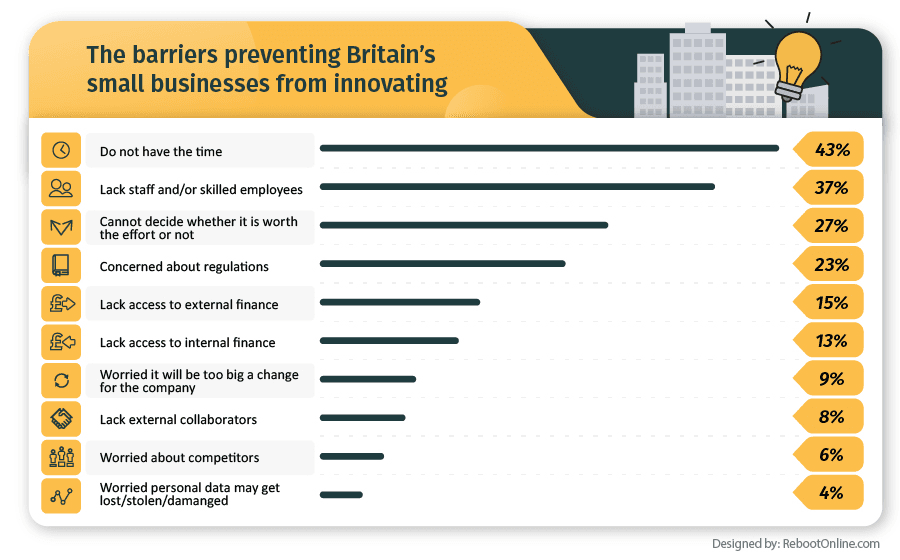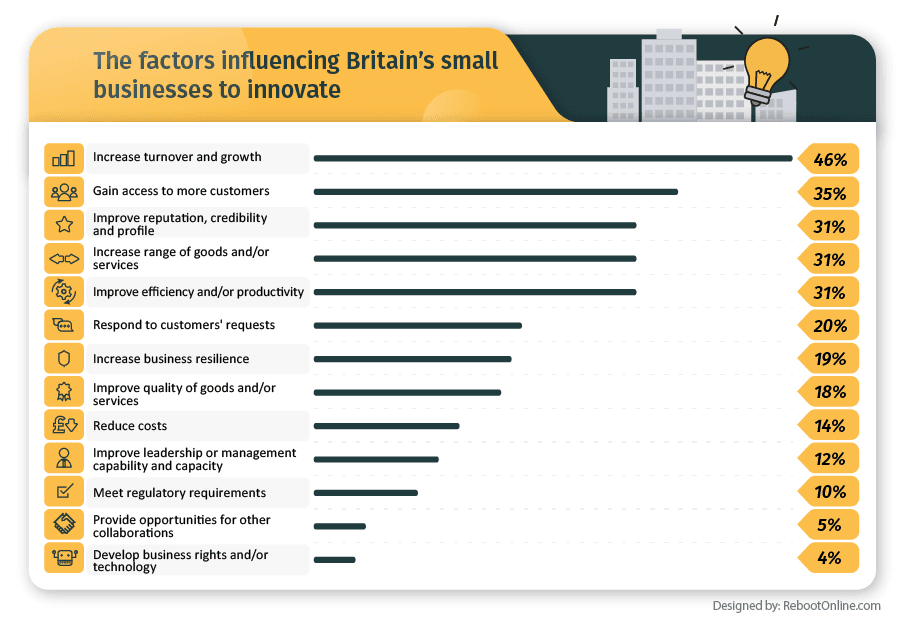The Barriers Preventing Britain’s SMEs From Innovating
8 Sept 2022, 2:57 am GMT+1
Businesses who develop new products, services and processes – generally put themselves ahead of competitors and are in a better position to adapt to any changes in the needs/expectations of their customers. Those companies that fail to innovate, will undoubtedly suffer from poor operational and financial performance. At the same time, lack sustainability for long-term survival and success. The notion of taking a pro-active approach towards innovation should ring especially true for startups. Especially, when only 15% of new companies go on to become profitable, according to statistics from the ‘Sussex Innovation Centre’. Interested in strategy and development,
analysed the latest findings from ‘The Federation of Small Businesses’, who surveyed 1,279 small British businesses to better understand their varying motivations for innovating. The company found the primary driver for small companies in the UK to innovate is fuelled by their desire to increase turnover and accelerate growth prospects (46%). Thereafter, 35% seek to innovate as a means of gaining access to more customers.

Interestingly, 31% of companies in their infancy want to introduce fresh products/services/processes/ strategies, as they believe it will enhance their reputation, credibility and profile. Likewise, 31% of small firms innovate to expand their existing offering by adding a range of new goods and/or services. Given the turbulent economic climate over the last decade, 19% engage in innovation to make their enterprise more resilient to such macro and micro pressures. Contrastingly, start-ups are least enthusiastic about innovating with the aim of developing business rights/technology, with only 4% doing so for those purposes. Slightly above, just 5% want to upgrade different aspects of their operations through implementing new ideas/concepts because of the potential (internal and external) collaboration opportunities it may lead to. Furthermore, the Knowledge Academy also sought to identify the biggest barriers which are preventing small businesses from actively innovating. From this, it was revealed that a lack of time (43%) is the main obstacle stopping entrepreneurs from innovating. Subsequently, 37% cite being short-staffed and/or not having enough skilled talent, as the principle factor in their decision not to innovate. Whilst, 27% of owners are unable to conclude, if pursing innovation will be a worthwhile venture for them or not.

Looking it at from a financial perspective, a considerable number of key-decision makers feel they are restricted in their ability to access external (15%) and internal (13%) funding avenues to acquire the estimated resources they would need to push innovation as a key initiative in their organisation. For 9% of small enterprises (based on their current set-up/structure) - they fear the drastic change innovation could spark, would be too big off a challenge for them to competently manage it. Opposingly, a mere a 4% choose not to innovate over data privacy concerns. For a small proportion of businesses, the worries they have about the activities and actions of their competitors (6%), is directly holding them back from innovating. Joseph Scott, a spokesperson from the TheKnowledgeAcademy.com commented:
“Every business, regardless of the sector they are in – faces a ton of challenges and pressures. Consequently, to stay ahead of the curve, firms need to make a consistent effort to assess and improve various aspects of their operations. One of the fundamental pillars behind this should be innovation. Businesses that take innovation seriously, can experience significant benefits. Afterall, innovation enables careful problem solving and generates effective solutions as to how companies can establish a distinctive competitive advantage. Similarly, provide more thought-out and flexible approaches towards meeting defined objectives over set periods of time – whether that be expanding products/services portfolio or generating greater profit margins”.
Share this
previous
The Speaker's Coach: 60 Secrets to Become a Public-Speaking Pro
next
Tech Industry: Three Quarters of Workers Believe that Women are Underrepresented